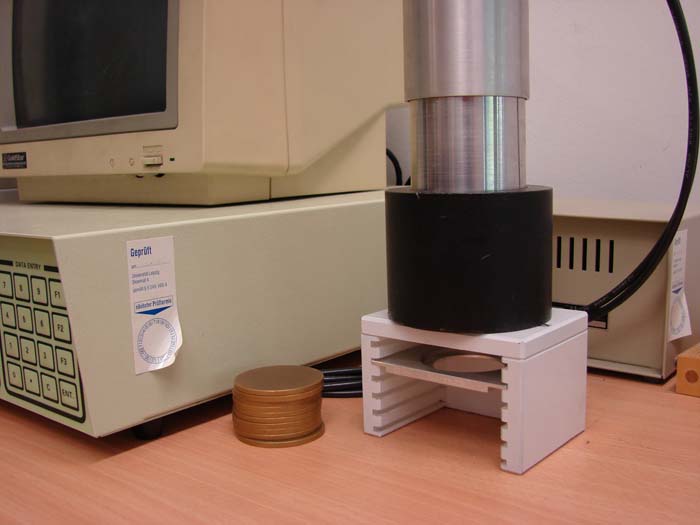ASTM D7282 Gross Alpha and Beta Measurement in Soils
The ASTM D7282 standard provides a method to measure gross alpha and beta activity levels in soil samples. This service is essential for environmental monitoring, particularly in areas where there has been potential contamination from radioactive materials due to industrial activities or natural sources.
Understanding the presence of radionuclides like uranium (U-238), thorium (Th-232), and potassium-40 (K-40) is critical for ensuring public safety, regulatory compliance, and environmental stewardship. This service helps to identify whether levels exceed permissible limits set by national regulations such as the U.S. Environmental Protection Agency or international standards like those recommended in ISO 17623:2005.
The ASTM D7282 procedure involves collecting soil samples from designated locations, transporting them back to the laboratory for preparation, and then subjecting these prepared samples to gamma spectroscopy and alpha/beta counting techniques. Gamma spectroscopy is used primarily to measure the gross alpha activity in the sample, while alpha/beta counting provides an accurate count of beta-emitting radionuclides.
Before conducting any measurements, thorough sample preparation is crucial. This includes drying, sieving, and blending the collected soil samples according to specific ASTM protocols. The homogeneity of the sample ensures consistent results throughout the testing process.
The instrumentation used for this service typically comprises a low-background gamma spectrometer with high-purity germanium (HPGe) detector, as well as a scintillation or proportional counter for alpha/beta counting. These instruments are calibrated regularly to maintain accuracy and precision in all measurements.
Once the samples have been prepared and measured using the specified methods outlined in ASTM D7282, the results are compiled into detailed reports that include raw data, calculated activity concentrations, and comparisons against relevant regulatory limits. This comprehensive approach ensures that clients receive reliable information they can rely upon when making decisions about site remediation or compliance actions.
For quality managers responsible for overseeing environmental initiatives at industrial facilities, this service offers valuable insights into potential risks associated with soil contamination. Compliance officers will find it useful in ensuring adherence to legal requirements regarding the handling and disposal of radioactive waste materials. R&D engineers can leverage these findings to develop safer processes that minimize exposure hazards, while procurement teams may use this data when sourcing raw materials from suppliers who adhere to strict quality controls.
By adhering strictly to ASTM D7282 guidelines, laboratories like ours provide clients with confidence knowing their results meet stringent industry standards. Our experienced staff ensures each step of the process follows best practices, delivering accurate and reliable test outcomes every time.
Benefits
- Ensures compliance with environmental regulations regarding radioactive contamination in soils.
- Provides reliable data for decision-making related to site remediation efforts or regulatory submissions.
- Supports quality management by identifying potential risks associated with soil contamination early on.
- Facilitates safer working environments by minimizing exposure hazards through informed action plans based on test results.
Environmental and Sustainability Contributions
Implementing ASTM D7282 gross alpha and beta measurement in soils contributes positively to environmental sustainability initiatives. By accurately detecting and quantifying radioactive contaminants, this service aids in preventing further spread or accumulation of these harmful substances within ecosystems.
The identification and mitigation of such pollutants help protect natural habitats from degradation caused by human activities. Moreover, reducing the presence of radioactive materials lowers overall ecological risk factors for both flora and fauna living in contaminated areas.
Additionally, this service plays a crucial role in promoting responsible resource management practices among industrial operations. Understanding levels of radioactivity allows companies to implement targeted measures aimed at lowering emissions and waste generation rates over time. Over the long term, these efforts contribute significantly towards achieving global sustainability goals set forth by organizations like the United Nations.
Competitive Advantage and Market Impact
In today’s competitive market, businesses operating within regulated industries must demonstrate their commitment to maintaining high standards of environmental responsibility. Offering ASTM D7282 gross alpha and beta measurement services positions organizations as leaders in sustainability practices.
Clients choosing our laboratory benefit from state-of-the-art technology combined with experienced personnel dedicated solely to delivering precise analytical results. This translates directly into enhanced reputation among peers, potential clients, and stakeholders alike who appreciate transparent reporting on environmental performance metrics.
Furthermore, the ability to quickly respond to regulatory changes or emerging trends in sustainability can give businesses a strategic edge over competitors lagging behind in these areas. By staying ahead of compliance requirements through proactive testing solutions like those provided here, companies position themselves favorably for long-term success and growth within their respective markets.





